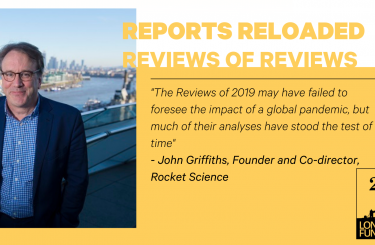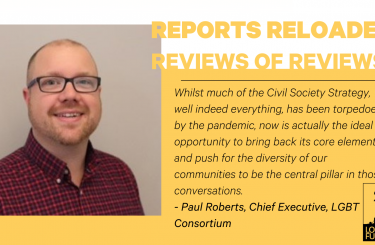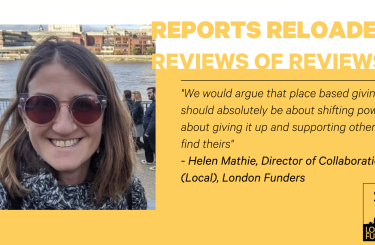The coronavirus pandemic has catapulted funders towards flexibility. Previously sacrosanct processes and restrictions have been set aside, and in their place, funders have placed a premium on trust. How can we hold onto this step change?
The Covid-19 funding experience echoes the progressive practices highlighted in our 2018 report The Possible, not the Perfect, which looked at the key features of funders’ grant-making responses to the Grenfell Tower fire, the London Bridge and Borough Market attacks, and the Manchester Arena bomb. Working with London Funders, we found that across a number of the collaborative funds set up in response to these emergencies, funders stepped outside their normal practices in five different ways:
- Commitment to speed
- Light-touch application and monitoring
- Managing risk through relationships
- Collaborative delivery and delegated decision-making
- Flexible funding
Our observation at the time was that these five bullets captured ‘a particular approach to grant-making, one that is sensitive and attuned to beneficiaries. It is highly relational, rather than contractual; it places a premium on trust; and it suggests a kind of common endeavour, where the assets of the funder (in this case, money) are combined with the assets of grantees (their work) for the common good’.
‘Being effective’ in these circumstances did not mean delivering a perfect grant programme that no-one could question or criticise. Rather, it meant finding a way to direct money quickly and intelligently to where it was most needed.
‘Being effective’ in these circumstances did not mean delivering a perfect grant programme that no-one could question or criticise. Rather, it meant finding a way to direct money quickly and intelligently to where it was most needed. Drawing on the words of organisations and groups in receipt of emergency funding, we understood ‘effectiveness’ in this context as meaning ‘straightforward, easy, quick and trusting’.
The funders and community organisations we spoke to in 2018 were united in their hope that some of the ways of doing things that proved possible in an emergency would influence how funders behaved in their day-to-day work. Drawing on their experience, we concluded The Possible, not the Perfect by proposing three areas where there was real potential to bring greater urgency, responsible lightness of touch and more open relationships into day-to-day grant-making practice, balancing scrutiny and trust:
1. Streamlining core processes (due diligence, decision-making and reporting)
2. Creating opportunities for funders and funded organisations to talk
3. Experimenting, learning and improving together
Being involved in these emergency programmes demonstrated that it was possible for funders to work differently, to the great benefit of funded organisations and the communities that they serve. Our sense was - around the time of the publication of The Possible not the Perfect - that these positive experiences had generated enthusiasm for more collaborative, practical experimentation. And that funders were ready to take a chance, learn and do better next time. The plea that resonated most loudly across our study was: ‘There is an opportunity here and it would be a shame to let it go. Let’s not get too bogged down in all the problems and challenges – all it takes is a few organisations who are willing to get on with trying out some of these ideas to see how they work.’
In practice, we saw only patchy and sporadic adoption of these more flexible and trusting approaches. Until, that is, the outbreak of the coronavirus pandemic.
In practice, we saw only patchy and sporadic adoption of these more flexible and trusting approaches. Until, that is, the outbreak of the coronavirus pandemic. An emergency that touched and affected us all, not just a small handful of funders. An emergency of such complexity and magnitude that everyone was required not just to step outside the normal, but to reframe their understanding of what ‘normal’ is. Although that was daunting and, at times, overwhelming, the lessons set out in The Possible, not the Perfect provided both a guide and a comfort. It was possible to give up some power, and to be more open and trusting: the sky didn’t fall in. It turned out that the seeds for change had been sown.
In February 2021, we set up a community of open and trusting grantmakers committed to retaining the flexible approach to funding that felt so easy in response to the immediate emergency of Covid-19. In doing this, we learnt many lessons from The Possible, not the Perfect. Our 90 open and trusting grantmakers haven’t just signed on the dotted line; they’ve published the practical changes they’re making to open and trusting grant-making, they join regular community of practice meetings to reflect and learn, and they are committed to being held to account by charities. This is what we’re working on at the moment – a simple way to flip the narrative so that funders are reporting to charities on how they are getting money into communities as quickly and smoothly as possible, and trusting people embedded in those communities to spend money well.
Our hope – and our commitment to the sector – is that, this time, we’ll make change stick.


